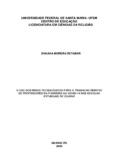| dc.contributor.advisor | Trevisan, Amarildo Luiz | |
| dc.creator | Retamar, Shaiana Moreira | |
| dc.date.accessioned | 2021-03-05T16:58:19Z | |
| dc.date.available | 2021-03-05T16:58:19Z | |
| dc.date.issued | 2020-12-01 | |
| dc.date.submitted | 2020 | |
| dc.identifier.uri | http://repositorio.ufsm.br/handle/1/20381 | |
| dc.description | Trabalho de conclusão de curso (graduação) - Universidade Federal de Santa Maria, Centro de Educação, RS, 2021 | por |
| dc.description.abstract | This article focuses on the technological means, used by students to transmit the content to their students, because from the pandemic we are experiencing today, schools were closed so that we could maintain social distance, and the COVID- virus would not proliferate. 19, which kills thousands of Brazilians through flu-like symptoms, causing serious pulmonary complications, among others. In view of this scenario, we seek through this article to try to review the concepts as educators and the ways to make knowledge happen through online classes, through technology, the media, social networks, because they do not have physical contact with students. The main objective is to seek to find out how education will continue its teaching, the methods that teachers should modernize, what students want after and before this pandemic. However, they should observe if there was really teaching-learning through these online classes, check whether the news and information transmitted to students by teachers are true or fakes, and whether technological means have helped education or not. Through a bibliographic search, we bring Cyntía Alves (2019), which contextualizes school and education as a historical process of construction and exchange of knowledge. Also, Paulo Rodrigues (2020) and Celio Leandro (2020), who outline, respectively, about the behavior of the virus and the way in which remote education works in schools. Finally, the importance of education and technological means is emphasized, having as reference the understanding and interpretation of Harasim (2005). It is concluded that the teachers were able to review, reevaluate, and reinvent their didactic methodologies, in order for real teaching and learning to take place and to continue the academic year 2020. | eng |
| dc.language | por | por |
| dc.publisher | Universidade Federal de Santa Maria | por |
| dc.rights | Acesso Aberto | por |
| dc.rights | Attribution-NonCommercial-NoDerivatives 4.0 International | * |
| dc.rights.uri | http://creativecommons.org/licenses/by-nc-nd/4.0/ | * |
| dc.subject | Meios tecnológicos | por |
| dc.subject | Pandemia | por |
| dc.subject | Educação | por |
| dc.subject | Technological means | eng |
| dc.subject | Pandemic | eng |
| dc.subject | Education | eng |
| dc.title | O uso dos meios tecnológicos para o trabalho remoto de professores na pandemia da Covid-19 nas escolas estaduais de Quaraí | por |
| dc.title.alternative | The use of technological means for the remote work of teachers in the pandemic in the Covid 19 in the state schools of Quaraí | eng |
| dc.type | Trabalho de Conclusão de Curso de Graduação | por |
| dc.degree.local | Polo de Quaraí, RS, Brasil | por |
| dc.degree.graduation | Ciências da Religião | por |
| dc.description.resumo | Este artigo enfoca os meios tecnológicos, utilizados pelos educandos para transmitir o conteúdo aos seus alunos, pois a partir da pandemia que estamos vivenciando nos dias atuais, as escolas foram fechadas para que mantivéssemos o distanciamento social, e não se proliferasse o vírus da COVID-19, que mata milhares de brasileiros, através de sintomas gripais, causando graves complicações pulmonares, entre outras. Tendo em vista esse cenário, buscamos através desse artigo tentar rever os conceitos como educadores e as formas de fazer acontecer o conhecimento através de aulas online, através da tecnologia, dos meios de comunicação, das redes sociais, pois os mesmos não tem o contato físico com os alunos. O maior objetivo é buscar descobrir de que forma a educação irá continuar o seu ensino, os métodos que os professores deverão se modernizar, quais os anseios dos alunos após e diante a essa pandemia. No entanto devem observar se realmente houve ensino-aprendizagem através dessas aulas on line, aferir se as notícias e informações transmitidas aos alunos pelos professores são verdadeiras ou fakes, que se os meios tecnológicos auxiliaram ou não a educação. Mediante uma pesquisa bibliográfica, trazemos Cyntía Alves (2019), que contextualiza a escola e a educação como sendo um processo histórico de construção e trocas de conhecimentos. Também, Paulo Rodrigues (2020) e Celio Leandro (2020), os quais gizam, respectivamente, sobre o comportamento do vírus e a maneira pela qual o ensino remoto funciona nas escolas. Por fim, ressalta-se a importância da educação e dos meios tecnológicos, tendo como referência a compreensão e interpretação de Harasim (2005). Conclui-se que os professores conseguiram rever, reavaliar, e reinventar as suas metodologias didáticas, para ocorrer o verdadeiro ensino e aprendizagem e dar sequência ao ano letivo de 2020. | por |
| dc.publisher.country | Brasil | por |
| dc.publisher.initials | UFSM | por |
| dc.subject.cnpq | CNPQ::CIENCIAS HUMANAS::TEOLOGIA | por |
| dc.publisher.unidade | Centro de Educação | por |



